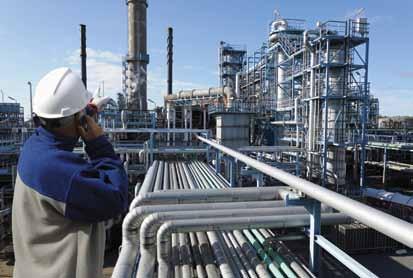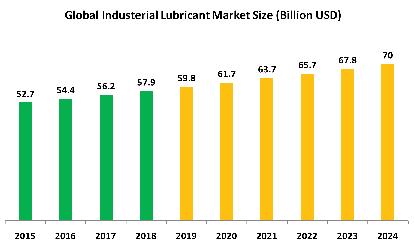3 minute read
Successful Application of A New Inertial Steering Mode of Point-the-Bit RSS in Middle East Oilfield
Next Article
became lighter in weight, lighter weight industrial lubricating oils were developed to cope with the speed of operation and increased heat generated by high speed machinery. Highly viscous industrial lubricating oils were developed to fill sumps and baths so that delicate machinery was kept constantly lubricated. The lubricating oil was itself cooled by running it through water and air cooled pipes. As each new engineering challenge was met, a new industrial lubricating oil was developed to service its needs. The early days of the automotive industry saw a huge amount of development money spent on creating efficient lubricating oils that could cope with the constant high speed movement of machine parts. ‹Cutting edge› lubricating oil development funded by the pioneers of the motor manufacturing industry and aimed at increasing the efficiency of the motor car also enabled the development of new and more efficient industrial lubricating oils for powered lathes, milling machines and other heavy machinery. These early industrial lubricating oils were mostly refined lubricants produced from mineral oils or crude oils; but the ever increasing demands made by a fast moving industry prompted the development of a new kind of industrial lubricant: synthetic industrial lubricating oil. Synthetic lubricating oils are a complex scientifically engineered alternative to petroleum-refined lubricants and provide greater performance and reliability. They combine enhanced mechanical and chemical properties to deliver the required level of performance. Several types of synthetic industrial lubricating oils exist, all containing organic compounds or synthetic hydrocarbons. High speed machines of all types - from state of the art commercial printers to supersonic aircraft - rely on a wide range of highly developed industrial lubricating oils to keep them running smoothly. Development is ongoing and new lubricants are constantly required to meet the demands of modern industrial engineering.
Industrial lubricating oils Interesting facts:
■ Industrial lubricants, fluids and coolants are highly specialized and are carefully designed to perform specific tasks. ■ Industrial lubricants are used for several reasons including the reduction of thermal deformation. ■ Industrial lubricants work as a cooling agent and can help to prevent unwanted materials from adhering to surfaces. ■ Industrial lubricants can help reduce the effects of corrosion and rust. ■ Lubricants help to reduce wear and tear, prolong the life of tools and other moving parts, reduce the time spent on maintenance - and of course ultimately ensure a company›s profitability over the long term. ■ Different industrial lubricants possess different properties and features. Features that might be important when choosing specific oil include resistance to heat, oxidation inhibiting ability and biodegradable ability. ■ Flash point is an important consideration when choosing an industrial lubricating oil - the flash point is the lowest temperature at which liquid can emit enough vapors to cause an ignition. ■ Some industrial lubricants contain a high percentage of water and are generally known in the industry as HWCF - high water content fluids. ■ Synthetic industrial lubricants generally provide an effective resistance to heat as well as excellent cooling abilities; they don,t contain a petroleum or mineral oil base.
Industrial lubricants Market Segmentation
The tremendous growth of industrial production, and increased trade, are primarily responsible for the high consumption of industrial lubricants. The major end-use industries for industrial lubricants are construction & mining, metal production, cement production, automotive, power generation, marine, food processing, paper, wood, aviation, and others.
Construction & Mining
A construction site is full of harsh conditions, where the majority of construction equipment is exposed to extreme cold, heat, moisture, and dust, which can affect the performance of equipment. The use of appropriate industrial lubricant on a construction site helps to prevent equipment failure, eliminate downtime and reduces operating cost. There are various heavy loads, mobile, and processing equipment in mining that need industrial lubricants on a large scale. Bucket wheel, excavators, dragline, electric rope shovel, hydraulic shovel, and mining truck uses industrial lubricants such as hydraulic oil, grease, and gear oil.
Metal Production
The metal production consumes industrial lubricants on a large scale. The metal production process includes various tasks such as metal cutting, metal grinding, metal forming, and metal joining that operate in extreme environments. The use of industrial lubricants during these processes help to reduce production costs & operating temperature, improve machining quality, and extends the machine life.
Cement Production
The cement production plant has some tough operating conditions. The cement manufacturing process involves a variety of heavy duty equipment. The key machines in the cement production plant include crushers, mills, kilns, and coolers. These machines are mainly exposed to the highly abrasive dust, high temperatures, vibrations, and high load.




